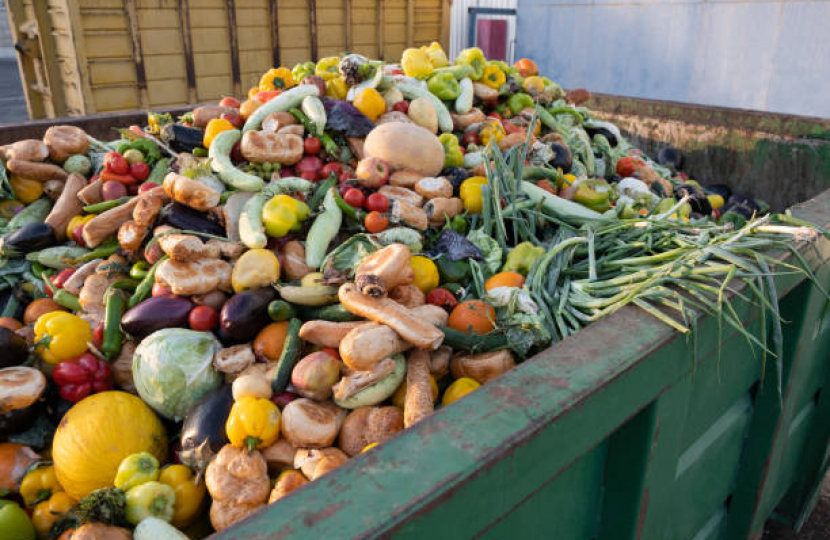
Capturing Energy in Food Waste to Bring Down Domestic and Agricultural Fuel Costs
Statement of Problem
Globally we create 1.3 billion tons of food waste each year that is mainly sent to landfill resulting in 70 million tons of methane emissions per annum. All the food waste that goes to landfill creates 5% of all our greenhouse gas emissions.
61% of food waste is domestic with each household creating 715 kg per annum.
In addition, food waste disposal via kerbside recycling contaminates dry materials like paper and card making them harder and more expensive to recycle, leading to the continued decline in UK recycling rates.
The UK imports 200m tons of fertilizer a year, much of it from Russia, meaning the cost of fertilizer has almost doubled in the last 6 months from £660 per ton to over £1100 per ton. The UK puts 6.5m tons of food waste into landfill each year.
Proposal
I propose to use the existing sewage network to take food waste to be processed by Anaerobic Digestion (AD) plants at water treatment facilities. Here it can used to feed the AD plant to increase the production of biogas, this can be refined and fed into the gas grid or converted into electricity and fed into the electricity grid. Typically, water treatment facilities are adjacent to either the electricity or gas grid or both. There is little mass loss when gas is created so the residual by-product can then be used as fertilizer. Also, the food waste has not been consumed before entering the sewage system so has a higher gas yield.
In the UK there are 215,000 miles of sewage pipes connected to 9,000 sewage plants; 66% of sewage is already processed in AD plants. Domestically, this would only require a waste disposal unit that can be easily retrofitted to most kitchens.
Each household would create an energy source and contribute to the UK supply, in recompence for this each household would benefit from an average 8% reduction in their energy bill. This 8% represents the average amount of food waste created per household and then converted into the electricity it will generate.
Objectives and expected long-term impact
Increased recycling levels due to a reduction in contamination dry recyclables. Reduction in greenhouse gas emissions by up to 5%. An up to 8% reduction in an average household energy bill. Cheaper supply of fertilizer to UK farmers. The tools to measure these outcomes are already in place.
Supported evidence or experience of others and potential unintended consequences
In the US most households have a waste disposal unit in the kitchen, so their food waste is converted to a liquid that combines with the sewage waste. There could be an unintentional misuse by the domestic user creating blockages, however the mechanism breaks the items down into a viscous liquid and blockages are rare.
Cost and costing rationale
The installation of the sink unit would cost £500 per household, financed by a Government Scheme that would award a grant to retro fit older properties. The scheme would be similar to the successful Boiler Upgrade Scheme. New builds would be required to fit a units, so overtime the costs would reduce. A key cost benefit is the infrastructure linking each household to an AD plant at the sewage works already exists and has been paid for. The scheme would be very easy to pilot so costs could be minimised and effectiveness established before a national roll out. The installation of the pasteurisation unit at the AD plant would require capital investment from the Water Company, however they would quickly cover the costs of their investment from the profits from sales of additional fertilizer.
Mechanism for evaluation
Data is already available on the recycling levels in the UK and therefore we could easily track the increase that the policy would cause. The Water Companies could meter the additional energy being produced and the agriculture industry would see an immediate reduction in fertilizer costs. Finally, the domestic energy price is already tracked, and it would be expected that each household taking advantage of the scheme would see up to a 8% reduction in bills.
Promotion of vision, values, and principles
Conservatives are the true environmental party and successive governments have overseen the boom in the UK of the renewable energy sector. We lead the world in green innovation and this policy will once again prove that we are the party that encourages green initiatives both domestically and commercially while creating new opportunities in our economy for investment. The opposition are unimaginative in the face of the energy and cost of living crisis, they can think no further than increasing windfall taxes and stifling investment, this policy, if opposed by Labour and the Liberal Democrats, once again shines a light on their short-sightedness in how to solve our long-term challenges.



